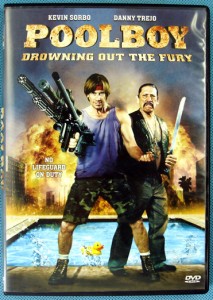 I first heard of independent filmmaker Ross Patterson about a month ago when Disc Dish got a press release for the upcoming DVD release of the movie Poolboy: Drowning Out The Fury (Screen Media, DVD
I first heard of independent filmmaker Ross Patterson about a month ago when Disc Dish got a press release for the upcoming DVD release of the movie Poolboy: Drowning Out The Fury (Screen Media, DVD $24.98), a low budget independent comedy produced by Street Justice Films, which I later learned was Patterson’s production company.
A send-up of 1990s action flicks and disgruntled-vets-returning-home dramas, Poolboy was written by Patterson, who also co-stars as Saint James St. James, a “legendary” old school filmmaker who pops up over the course of the movie as its “director” to look back on his film and crack wise on his narrative approach, production techniques and overall artistic brilliance.
A couple of weeks after reading the release and watching a screener of the film, a couple of Twitter tweets and an enthusiastic publicist led to my getting on the phone with Patterson to talk about Poolboy. My half-hour conversation with the friendly, fast-talking indie filmmaker found us talking about everything from Poolboy to his recent deal with IFC to the sopping 1995 action flick Waterworld.
Here are some excerpts from our bull session:
On Twitter:
Ross Patterson: My publicist was the one to tell me that I’ve got to start using Twitter and I‘m just getting acquainted with the whole thing.
Disc Dish: Really? I figured you’d be all over it
RP: Here’s the thing: I’m also a writer and I look at Twitter as another thing that’s just dumbing down the public. Abbreviations and all that—“C U there”—it’s just teaching kids to be dumber. What the hell? Eventually, they’re going to have to read something!
DD: Yeah, well, that’s what’s happening. One day all this technology is going to come back and bite us in the ass.
RP: Fuck yeah. That’s a short enough message for Twitter.
 On the state of Hollywood comedy:
On the state of Hollywood comedy:
RP: [Poolboy] comes from the grindhouse genre that I really enjoy and it kind of pokes fun at the genre and the entire Hollywood system of today. Original scripts, particularly comedies, just don’t get pushed through on the studio level. About two-thirds of total box office revenue now comes from the foreign market and the studios are caring less and less about American audiences. That explains all the sequels and superhero movies—that’s the kind of stuff that can get shipped around the world. Look at a movie like Gulliver’s Travels. I only grossed something like $40 million here, but it made millions more around the world.. Effects, action movies, things blowing up—that shit translates everywhere. Comedies definitely don’t. So ,in terms of original material, particularly comedies, the only way to see it these days is to do it independently. And that’s what’s happening all levels. Studios just wont’ push them through. Or you take a shot, make it on your own, and then maybe the studio will pick it up for half the cost and split the gross with you.
On obtaining the rights for songs for two popular Eighties song for Poolboy:
DD: Did you blow your budget getting the rights for “Dance Hall Days” by Wang Chung and “I Can’t Wait” by Nu Shooz for the film?
RP: No, that was surprisingly easy and [within our budget]. If you buy two songs from the same publisher at the same time, they’ll give you a discount.
DD: Wow, just like Walmart!
RP: Exactly, So what you do is hit up these music publishers—they’re all over town—and they’ll send you over a track list. Some of these lists are extremely extensive and each individual company can have the rights to a whole bunch of songs that you might want. So you’ll ask them about the price for one song and they’ll come back with a number—three grand, five grand, whatever—but then they’ll say that if you buy two, they’ll give you two thousand dollars off.
DD: I wonder what the artists think when they find out their songs are in the discount bin, as it were.
RP: The artists never, ever know about it. Trust me. Sure, the artists must have loved the song when they wrote it and made it a hit, but they don’t have any control any more. It’s the same old story—so many musicians signed over the rights back in the day not knowing what would happen.
DD: I know that was always the story way back when, but I figured that by the 1980s and onward, artists would have a better fix on the situation.
RP: They probably started taking it seriously then, but there’s no way around it. Take today’s artists. We tried to get a song from Asher Roth for this movie we just shot called 50K and a Call Girl. Asher’s a friend and he’s in the movie, but he has no rights over Universal, his publisher. So Universal will say, ‘We want $25,000 for the song.’ And no independent movie can afford that much for a song. And Asher just wants to have his song in the movie. It sucks!
On what Poolboy has yielded (after winning, notably, the 2011 Independent Pilot Competition IFC ‘Out of the Box’ Award at the New York Television Festival):
RP: IFC is turning it into a TV show. It’s called Saint James St. James Presents. Every week, St. James looks back at a different awful film he’s made over the past 25 years. And we tackle all the genres—horror movies, comedies, sci-fi and art pieces that he considers to be “arty,” like an Italian love story from the 1950s.
DD: Cool. How many shows did they commit to?
RP: We don’t know yet. We’re on the pilot right now–Poolboy just came out [last month] and the fan base is building, so we’ll see. These days, you have to shoot a pilot no matter how big or small your show is.
On Waterworld:
RP: Really underrated. How can you not love a film where the opening shot has Kevin Costner drinking his own urine?
|
Buy or Rent Poolboy: Drowning Out the Fury
|
|||
|---|---|---|---|
DVD |
 DVD DVD |
 DVD DVD |
|

Leave a Reply